Research Report: Crisis Management Practices at Hilton Post COVID-19
VerifiedAdded on 2023/06/17
|8
|2209
|232
Report
AI Summary
This research proposal examines the travel and tourism sector's response to the COVID-19 pandemic, focusing on crisis management practices at Hilton. It aims to analyze these practices, identify strategies adopted by Hilton, assess challenges faced, and recommend new strategies for implementation. The research employs a positivism philosophy and deductive approach, utilizing survey questionnaires and secondary data collection methods. Data analysis will involve frequency distribution analysis. The study addresses research questions related to Hilton's response to COVID-19, adopted crisis management strategies, challenges encountered, and recommended new strategies. It reviews literature on crisis management, emphasizing the importance of preparedness and adaptability in the face of unexpected events. The research methodology includes a detailed timescale for various activities, from topic selection to final proposal approval. This report, available on Desklib, offers a detailed analysis of Hilton's crisis management approach during the pandemic.
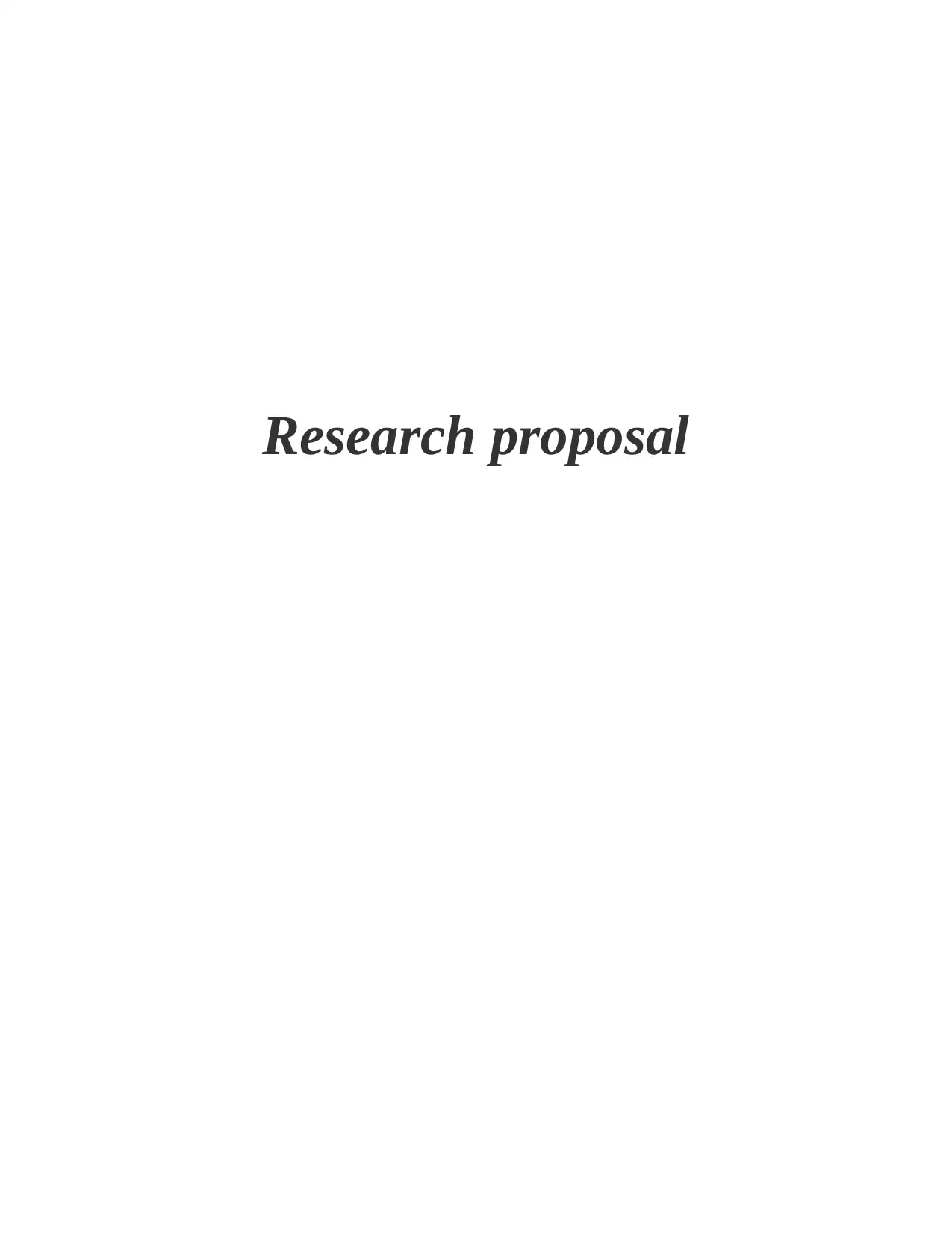
Research proposal
Paraphrase This Document
Need a fresh take? Get an instant paraphrase of this document with our AI Paraphraser
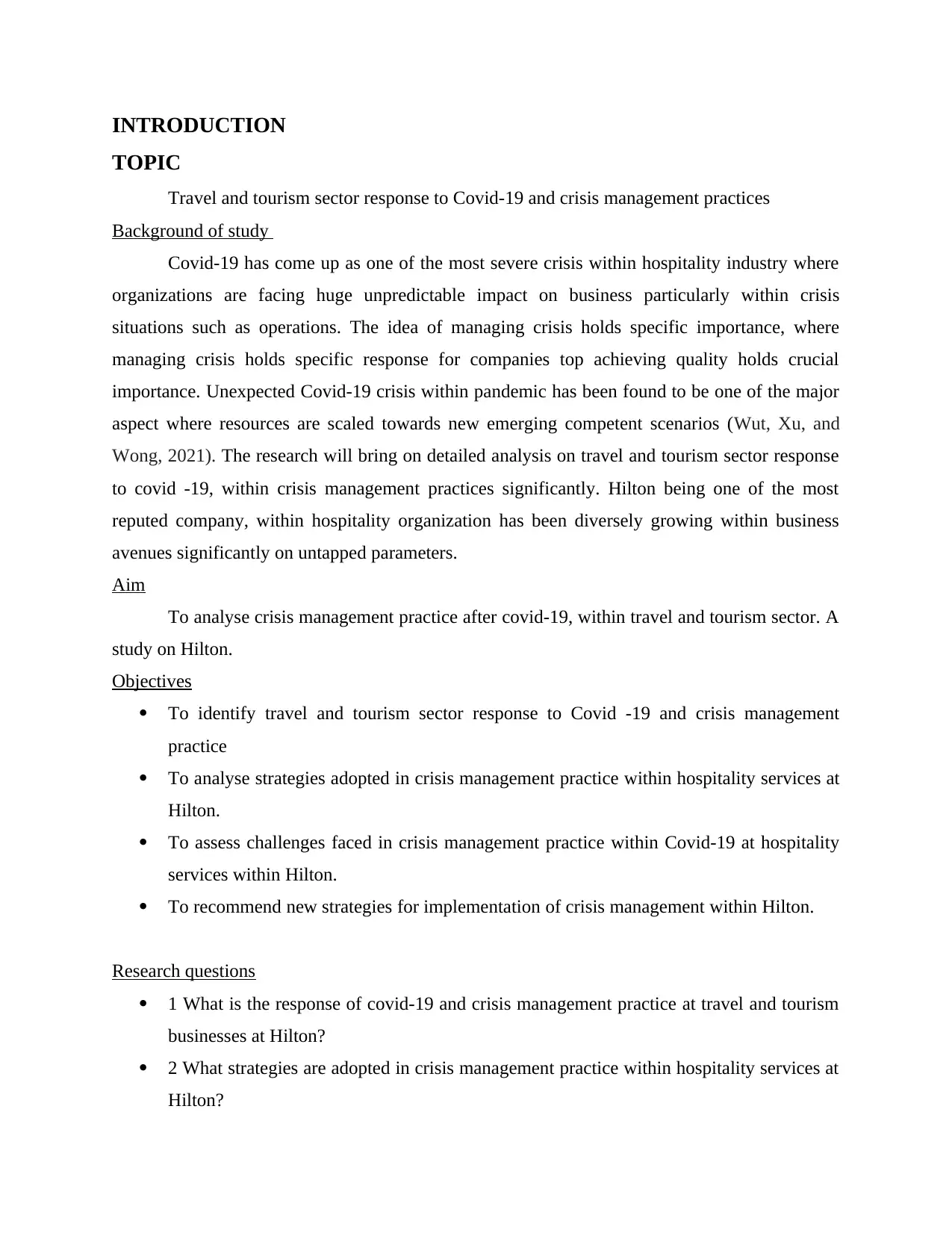
INTRODUCTION
TOPIC
Travel and tourism sector response to Covid-19 and crisis management practices
Background of study
Covid-19 has come up as one of the most severe crisis within hospitality industry where
organizations are facing huge unpredictable impact on business particularly within crisis
situations such as operations. The idea of managing crisis holds specific importance, where
managing crisis holds specific response for companies top achieving quality holds crucial
importance. Unexpected Covid-19 crisis within pandemic has been found to be one of the major
aspect where resources are scaled towards new emerging competent scenarios (Wut, Xu, and
Wong, 2021). The research will bring on detailed analysis on travel and tourism sector response
to covid -19, within crisis management practices significantly. Hilton being one of the most
reputed company, within hospitality organization has been diversely growing within business
avenues significantly on untapped parameters.
Aim
To analyse crisis management practice after covid-19, within travel and tourism sector. A
study on Hilton.
Objectives
To identify travel and tourism sector response to Covid -19 and crisis management
practice
To analyse strategies adopted in crisis management practice within hospitality services at
Hilton.
To assess challenges faced in crisis management practice within Covid-19 at hospitality
services within Hilton.
To recommend new strategies for implementation of crisis management within Hilton.
Research questions
1 What is the response of covid-19 and crisis management practice at travel and tourism
businesses at Hilton?
2 What strategies are adopted in crisis management practice within hospitality services at
Hilton?
TOPIC
Travel and tourism sector response to Covid-19 and crisis management practices
Background of study
Covid-19 has come up as one of the most severe crisis within hospitality industry where
organizations are facing huge unpredictable impact on business particularly within crisis
situations such as operations. The idea of managing crisis holds specific importance, where
managing crisis holds specific response for companies top achieving quality holds crucial
importance. Unexpected Covid-19 crisis within pandemic has been found to be one of the major
aspect where resources are scaled towards new emerging competent scenarios (Wut, Xu, and
Wong, 2021). The research will bring on detailed analysis on travel and tourism sector response
to covid -19, within crisis management practices significantly. Hilton being one of the most
reputed company, within hospitality organization has been diversely growing within business
avenues significantly on untapped parameters.
Aim
To analyse crisis management practice after covid-19, within travel and tourism sector. A
study on Hilton.
Objectives
To identify travel and tourism sector response to Covid -19 and crisis management
practice
To analyse strategies adopted in crisis management practice within hospitality services at
Hilton.
To assess challenges faced in crisis management practice within Covid-19 at hospitality
services within Hilton.
To recommend new strategies for implementation of crisis management within Hilton.
Research questions
1 What is the response of covid-19 and crisis management practice at travel and tourism
businesses at Hilton?
2 What strategies are adopted in crisis management practice within hospitality services at
Hilton?
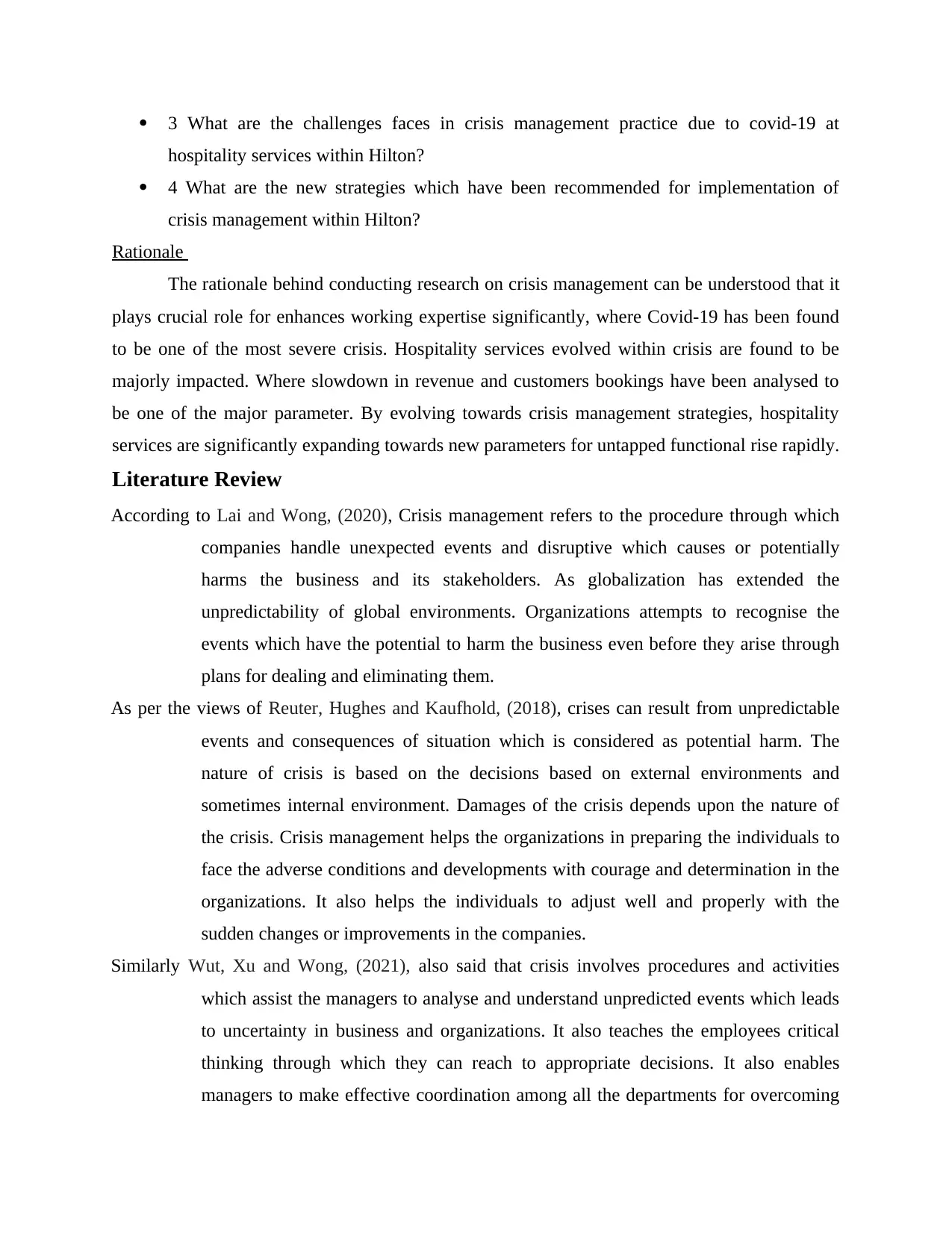
3 What are the challenges faces in crisis management practice due to covid-19 at
hospitality services within Hilton?
4 What are the new strategies which have been recommended for implementation of
crisis management within Hilton?
Rationale
The rationale behind conducting research on crisis management can be understood that it
plays crucial role for enhances working expertise significantly, where Covid-19 has been found
to be one of the most severe crisis. Hospitality services evolved within crisis are found to be
majorly impacted. Where slowdown in revenue and customers bookings have been analysed to
be one of the major parameter. By evolving towards crisis management strategies, hospitality
services are significantly expanding towards new parameters for untapped functional rise rapidly.
Literature Review
According to Lai and Wong, (2020), Crisis management refers to the procedure through which
companies handle unexpected events and disruptive which causes or potentially
harms the business and its stakeholders. As globalization has extended the
unpredictability of global environments. Organizations attempts to recognise the
events which have the potential to harm the business even before they arise through
plans for dealing and eliminating them.
As per the views of Reuter, Hughes and Kaufhold, (2018), crises can result from unpredictable
events and consequences of situation which is considered as potential harm. The
nature of crisis is based on the decisions based on external environments and
sometimes internal environment. Damages of the crisis depends upon the nature of
the crisis. Crisis management helps the organizations in preparing the individuals to
face the adverse conditions and developments with courage and determination in the
organizations. It also helps the individuals to adjust well and properly with the
sudden changes or improvements in the companies.
Similarly Wut, Xu and Wong, (2021), also said that crisis involves procedures and activities
which assist the managers to analyse and understand unpredicted events which leads
to uncertainty in business and organizations. It also teaches the employees critical
thinking through which they can reach to appropriate decisions. It also enables
managers to make effective coordination among all the departments for overcoming
hospitality services within Hilton?
4 What are the new strategies which have been recommended for implementation of
crisis management within Hilton?
Rationale
The rationale behind conducting research on crisis management can be understood that it
plays crucial role for enhances working expertise significantly, where Covid-19 has been found
to be one of the most severe crisis. Hospitality services evolved within crisis are found to be
majorly impacted. Where slowdown in revenue and customers bookings have been analysed to
be one of the major parameter. By evolving towards crisis management strategies, hospitality
services are significantly expanding towards new parameters for untapped functional rise rapidly.
Literature Review
According to Lai and Wong, (2020), Crisis management refers to the procedure through which
companies handle unexpected events and disruptive which causes or potentially
harms the business and its stakeholders. As globalization has extended the
unpredictability of global environments. Organizations attempts to recognise the
events which have the potential to harm the business even before they arise through
plans for dealing and eliminating them.
As per the views of Reuter, Hughes and Kaufhold, (2018), crises can result from unpredictable
events and consequences of situation which is considered as potential harm. The
nature of crisis is based on the decisions based on external environments and
sometimes internal environment. Damages of the crisis depends upon the nature of
the crisis. Crisis management helps the organizations in preparing the individuals to
face the adverse conditions and developments with courage and determination in the
organizations. It also helps the individuals to adjust well and properly with the
sudden changes or improvements in the companies.
Similarly Wut, Xu and Wong, (2021), also said that crisis involves procedures and activities
which assist the managers to analyse and understand unpredicted events which leads
to uncertainty in business and organizations. It also teaches the employees critical
thinking through which they can reach to appropriate decisions. It also enables
managers to make effective coordination among all the departments for overcoming
⊘ This is a preview!⊘
Do you want full access?
Subscribe today to unlock all pages.

Trusted by 1+ million students worldwide
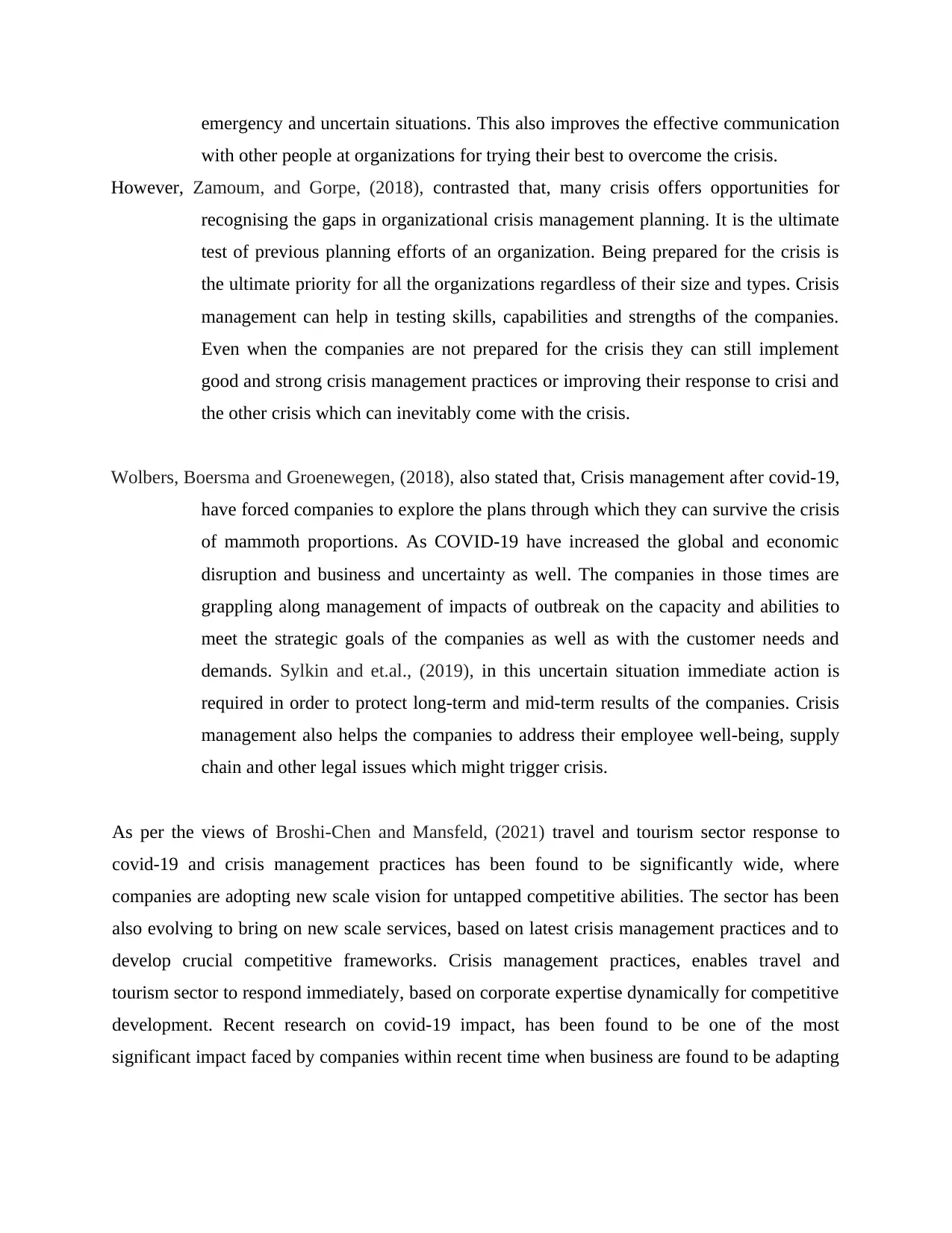
emergency and uncertain situations. This also improves the effective communication
with other people at organizations for trying their best to overcome the crisis.
However, Zamoum, and Gorpe, (2018), contrasted that, many crisis offers opportunities for
recognising the gaps in organizational crisis management planning. It is the ultimate
test of previous planning efforts of an organization. Being prepared for the crisis is
the ultimate priority for all the organizations regardless of their size and types. Crisis
management can help in testing skills, capabilities and strengths of the companies.
Even when the companies are not prepared for the crisis they can still implement
good and strong crisis management practices or improving their response to crisi and
the other crisis which can inevitably come with the crisis.
Wolbers, Boersma and Groenewegen, (2018), also stated that, Crisis management after covid-19,
have forced companies to explore the plans through which they can survive the crisis
of mammoth proportions. As COVID-19 have increased the global and economic
disruption and business and uncertainty as well. The companies in those times are
grappling along management of impacts of outbreak on the capacity and abilities to
meet the strategic goals of the companies as well as with the customer needs and
demands. Sylkin and et.al., (2019), in this uncertain situation immediate action is
required in order to protect long-term and mid-term results of the companies. Crisis
management also helps the companies to address their employee well-being, supply
chain and other legal issues which might trigger crisis.
As per the views of Broshi-Chen and Mansfeld, (2021) travel and tourism sector response to
covid-19 and crisis management practices has been found to be significantly wide, where
companies are adopting new scale vision for untapped competitive abilities. The sector has been
also evolving to bring on new scale services, based on latest crisis management practices and to
develop crucial competitive frameworks. Crisis management practices, enables travel and
tourism sector to respond immediately, based on corporate expertise dynamically for competitive
development. Recent research on covid-19 impact, has been found to be one of the most
significant impact faced by companies within recent time when business are found to be adapting
with other people at organizations for trying their best to overcome the crisis.
However, Zamoum, and Gorpe, (2018), contrasted that, many crisis offers opportunities for
recognising the gaps in organizational crisis management planning. It is the ultimate
test of previous planning efforts of an organization. Being prepared for the crisis is
the ultimate priority for all the organizations regardless of their size and types. Crisis
management can help in testing skills, capabilities and strengths of the companies.
Even when the companies are not prepared for the crisis they can still implement
good and strong crisis management practices or improving their response to crisi and
the other crisis which can inevitably come with the crisis.
Wolbers, Boersma and Groenewegen, (2018), also stated that, Crisis management after covid-19,
have forced companies to explore the plans through which they can survive the crisis
of mammoth proportions. As COVID-19 have increased the global and economic
disruption and business and uncertainty as well. The companies in those times are
grappling along management of impacts of outbreak on the capacity and abilities to
meet the strategic goals of the companies as well as with the customer needs and
demands. Sylkin and et.al., (2019), in this uncertain situation immediate action is
required in order to protect long-term and mid-term results of the companies. Crisis
management also helps the companies to address their employee well-being, supply
chain and other legal issues which might trigger crisis.
As per the views of Broshi-Chen and Mansfeld, (2021) travel and tourism sector response to
covid-19 and crisis management practices has been found to be significantly wide, where
companies are adopting new scale vision for untapped competitive abilities. The sector has been
also evolving to bring on new scale services, based on latest crisis management practices and to
develop crucial competitive frameworks. Crisis management practices, enables travel and
tourism sector to respond immediately, based on corporate expertise dynamically for competitive
development. Recent research on covid-19 impact, has been found to be one of the most
significant impact faced by companies within recent time when business are found to be adapting
Paraphrase This Document
Need a fresh take? Get an instant paraphrase of this document with our AI Paraphraser
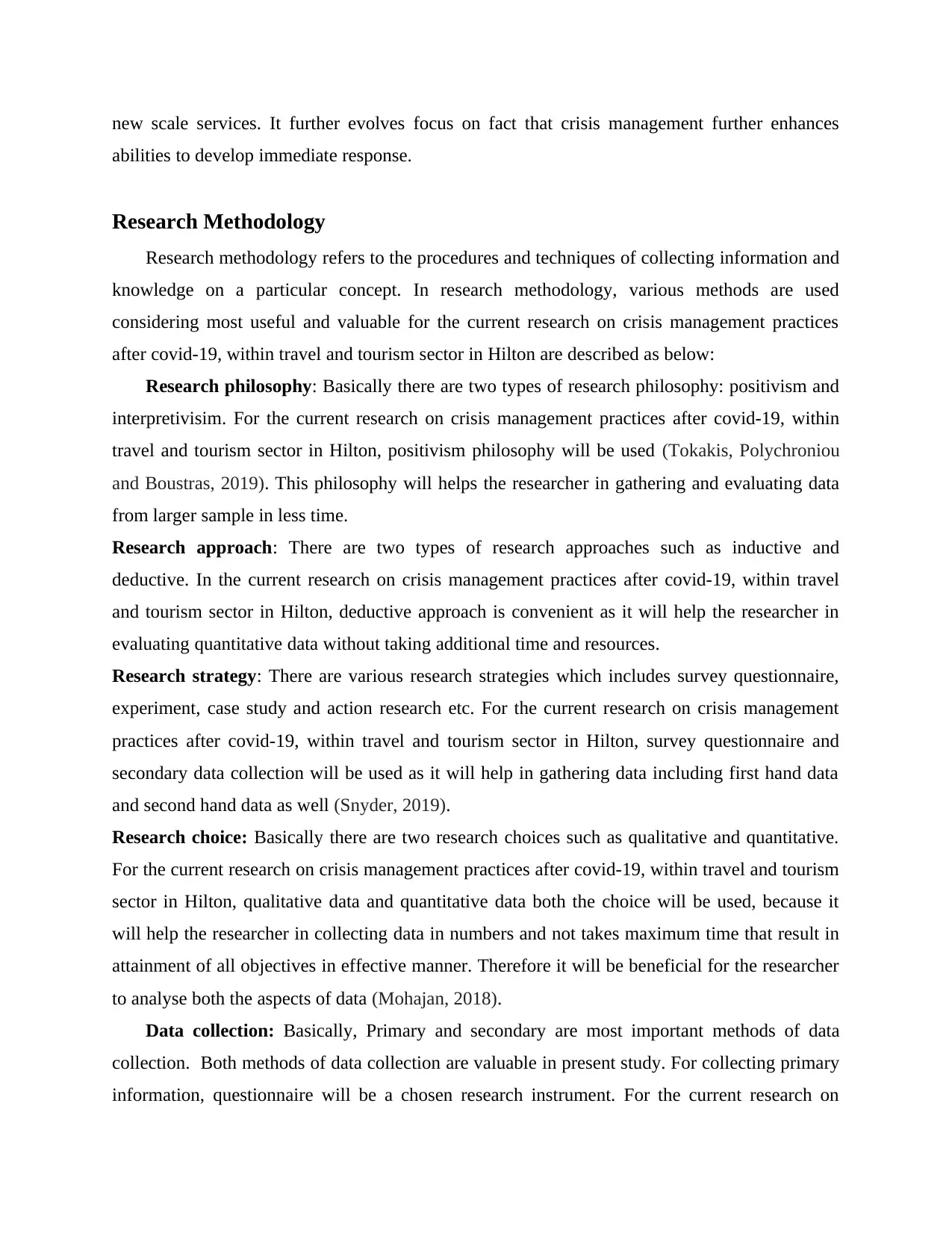
new scale services. It further evolves focus on fact that crisis management further enhances
abilities to develop immediate response.
Research Methodology
Research methodology refers to the procedures and techniques of collecting information and
knowledge on a particular concept. In research methodology, various methods are used
considering most useful and valuable for the current research on crisis management practices
after covid-19, within travel and tourism sector in Hilton are described as below:
Research philosophy: Basically there are two types of research philosophy: positivism and
interpretivisim. For the current research on crisis management practices after covid-19, within
travel and tourism sector in Hilton, positivism philosophy will be used (Tokakis, Polychroniou
and Boustras, 2019). This philosophy will helps the researcher in gathering and evaluating data
from larger sample in less time.
Research approach: There are two types of research approaches such as inductive and
deductive. In the current research on crisis management practices after covid-19, within travel
and tourism sector in Hilton, deductive approach is convenient as it will help the researcher in
evaluating quantitative data without taking additional time and resources.
Research strategy: There are various research strategies which includes survey questionnaire,
experiment, case study and action research etc. For the current research on crisis management
practices after covid-19, within travel and tourism sector in Hilton, survey questionnaire and
secondary data collection will be used as it will help in gathering data including first hand data
and second hand data as well (Snyder, 2019).
Research choice: Basically there are two research choices such as qualitative and quantitative.
For the current research on crisis management practices after covid-19, within travel and tourism
sector in Hilton, qualitative data and quantitative data both the choice will be used, because it
will help the researcher in collecting data in numbers and not takes maximum time that result in
attainment of all objectives in effective manner. Therefore it will be beneficial for the researcher
to analyse both the aspects of data (Mohajan, 2018).
Data collection: Basically, Primary and secondary are most important methods of data
collection. Both methods of data collection are valuable in present study. For collecting primary
information, questionnaire will be a chosen research instrument. For the current research on
abilities to develop immediate response.
Research Methodology
Research methodology refers to the procedures and techniques of collecting information and
knowledge on a particular concept. In research methodology, various methods are used
considering most useful and valuable for the current research on crisis management practices
after covid-19, within travel and tourism sector in Hilton are described as below:
Research philosophy: Basically there are two types of research philosophy: positivism and
interpretivisim. For the current research on crisis management practices after covid-19, within
travel and tourism sector in Hilton, positivism philosophy will be used (Tokakis, Polychroniou
and Boustras, 2019). This philosophy will helps the researcher in gathering and evaluating data
from larger sample in less time.
Research approach: There are two types of research approaches such as inductive and
deductive. In the current research on crisis management practices after covid-19, within travel
and tourism sector in Hilton, deductive approach is convenient as it will help the researcher in
evaluating quantitative data without taking additional time and resources.
Research strategy: There are various research strategies which includes survey questionnaire,
experiment, case study and action research etc. For the current research on crisis management
practices after covid-19, within travel and tourism sector in Hilton, survey questionnaire and
secondary data collection will be used as it will help in gathering data including first hand data
and second hand data as well (Snyder, 2019).
Research choice: Basically there are two research choices such as qualitative and quantitative.
For the current research on crisis management practices after covid-19, within travel and tourism
sector in Hilton, qualitative data and quantitative data both the choice will be used, because it
will help the researcher in collecting data in numbers and not takes maximum time that result in
attainment of all objectives in effective manner. Therefore it will be beneficial for the researcher
to analyse both the aspects of data (Mohajan, 2018).
Data collection: Basically, Primary and secondary are most important methods of data
collection. Both methods of data collection are valuable in present study. For collecting primary
information, questionnaire will be a chosen research instrument. For the current research on
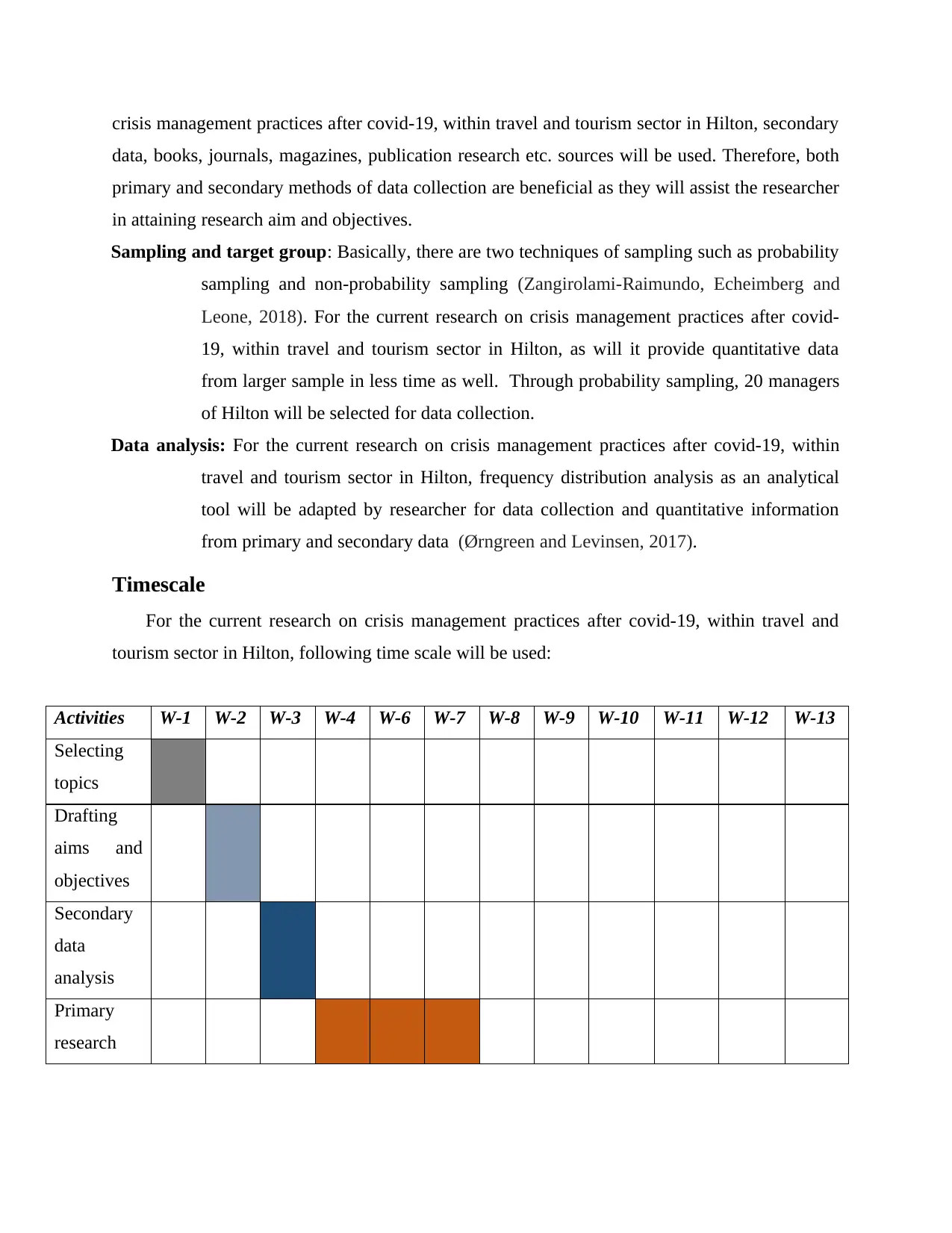
crisis management practices after covid-19, within travel and tourism sector in Hilton, secondary
data, books, journals, magazines, publication research etc. sources will be used. Therefore, both
primary and secondary methods of data collection are beneficial as they will assist the researcher
in attaining research aim and objectives.
Sampling and target group: Basically, there are two techniques of sampling such as probability
sampling and non-probability sampling (Zangirolami-Raimundo, Echeimberg and
Leone, 2018). For the current research on crisis management practices after covid-
19, within travel and tourism sector in Hilton, as will it provide quantitative data
from larger sample in less time as well. Through probability sampling, 20 managers
of Hilton will be selected for data collection.
Data analysis: For the current research on crisis management practices after covid-19, within
travel and tourism sector in Hilton, frequency distribution analysis as an analytical
tool will be adapted by researcher for data collection and quantitative information
from primary and secondary data (Ørngreen and Levinsen, 2017).
Timescale
For the current research on crisis management practices after covid-19, within travel and
tourism sector in Hilton, following time scale will be used:
Activities W-1 W-2 W-3 W-4 W-6 W-7 W-8 W-9 W-10 W-11 W-12 W-13
Selecting
topics
Drafting
aims and
objectives
Secondary
data
analysis
Primary
research
data, books, journals, magazines, publication research etc. sources will be used. Therefore, both
primary and secondary methods of data collection are beneficial as they will assist the researcher
in attaining research aim and objectives.
Sampling and target group: Basically, there are two techniques of sampling such as probability
sampling and non-probability sampling (Zangirolami-Raimundo, Echeimberg and
Leone, 2018). For the current research on crisis management practices after covid-
19, within travel and tourism sector in Hilton, as will it provide quantitative data
from larger sample in less time as well. Through probability sampling, 20 managers
of Hilton will be selected for data collection.
Data analysis: For the current research on crisis management practices after covid-19, within
travel and tourism sector in Hilton, frequency distribution analysis as an analytical
tool will be adapted by researcher for data collection and quantitative information
from primary and secondary data (Ørngreen and Levinsen, 2017).
Timescale
For the current research on crisis management practices after covid-19, within travel and
tourism sector in Hilton, following time scale will be used:
Activities W-1 W-2 W-3 W-4 W-6 W-7 W-8 W-9 W-10 W-11 W-12 W-13
Selecting
topics
Drafting
aims and
objectives
Secondary
data
analysis
Primary
research
⊘ This is a preview!⊘
Do you want full access?
Subscribe today to unlock all pages.

Trusted by 1+ million students worldwide
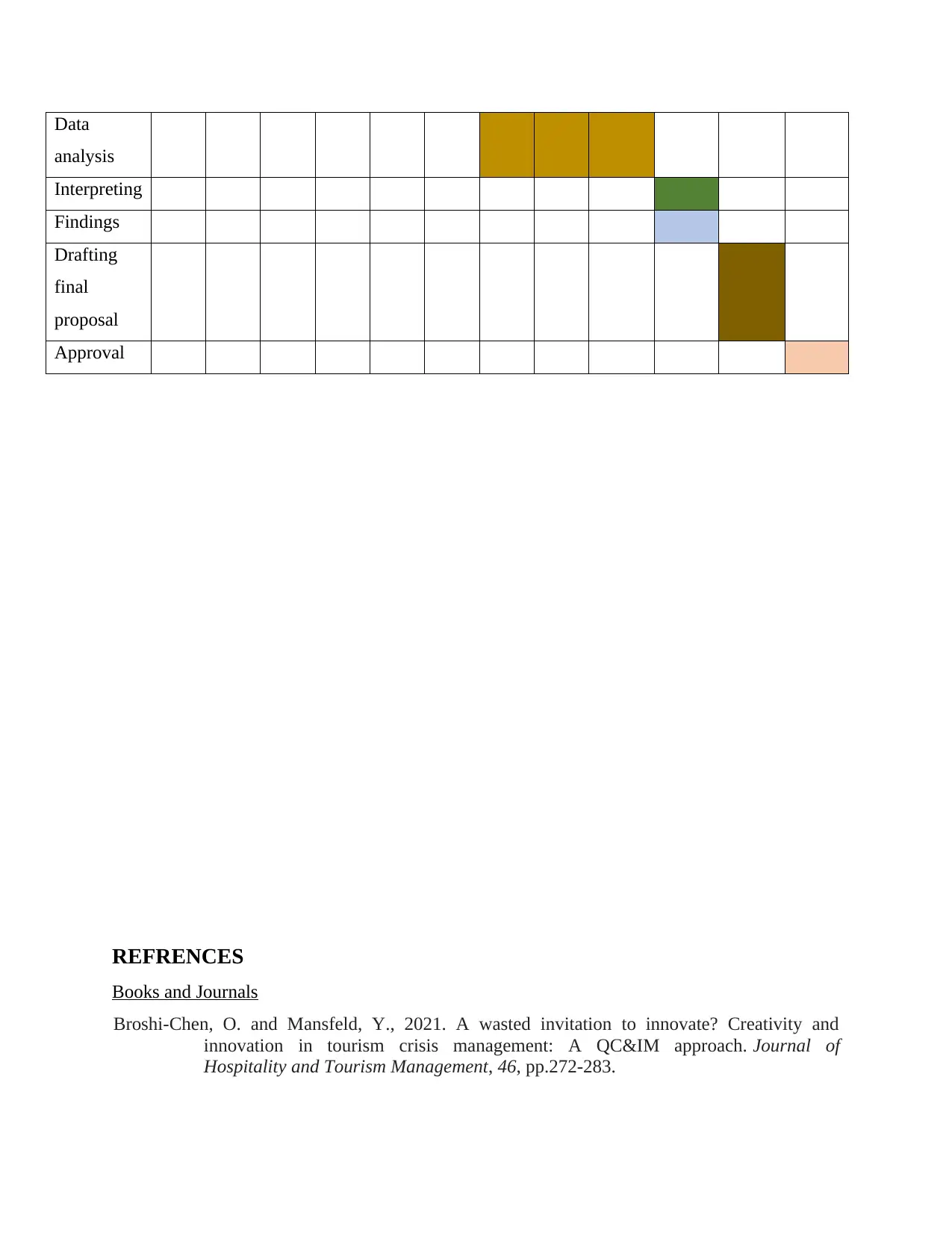
Data
analysis
Interpreting
Findings
Drafting
final
proposal
Approval
REFRENCES
Books and Journals
Broshi-Chen, O. and Mansfeld, Y., 2021. A wasted invitation to innovate? Creativity and
innovation in tourism crisis management: A QC&IM approach. Journal of
Hospitality and Tourism Management, 46, pp.272-283.
analysis
Interpreting
Findings
Drafting
final
proposal
Approval
REFRENCES
Books and Journals
Broshi-Chen, O. and Mansfeld, Y., 2021. A wasted invitation to innovate? Creativity and
innovation in tourism crisis management: A QC&IM approach. Journal of
Hospitality and Tourism Management, 46, pp.272-283.
Paraphrase This Document
Need a fresh take? Get an instant paraphrase of this document with our AI Paraphraser
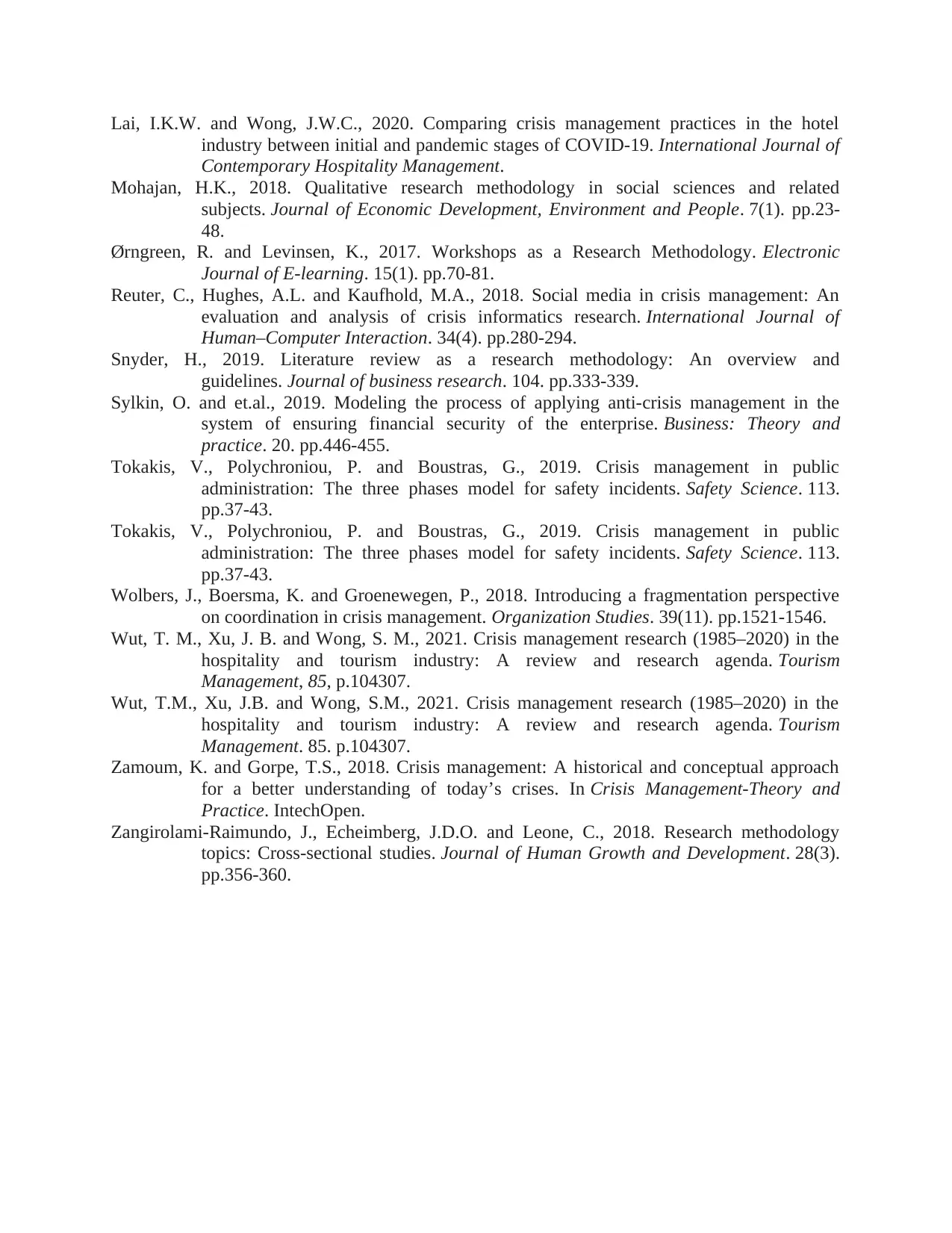
Lai, I.K.W. and Wong, J.W.C., 2020. Comparing crisis management practices in the hotel
industry between initial and pandemic stages of COVID-19. International Journal of
Contemporary Hospitality Management.
Mohajan, H.K., 2018. Qualitative research methodology in social sciences and related
subjects. Journal of Economic Development, Environment and People. 7(1). pp.23-
48.
Ørngreen, R. and Levinsen, K., 2017. Workshops as a Research Methodology. Electronic
Journal of E-learning. 15(1). pp.70-81.
Reuter, C., Hughes, A.L. and Kaufhold, M.A., 2018. Social media in crisis management: An
evaluation and analysis of crisis informatics research. International Journal of
Human–Computer Interaction. 34(4). pp.280-294.
Snyder, H., 2019. Literature review as a research methodology: An overview and
guidelines. Journal of business research. 104. pp.333-339.
Sylkin, O. and et.al., 2019. Modeling the process of applying anti-crisis management in the
system of ensuring financial security of the enterprise. Business: Theory and
practice. 20. pp.446-455.
Tokakis, V., Polychroniou, P. and Boustras, G., 2019. Crisis management in public
administration: The three phases model for safety incidents. Safety Science. 113.
pp.37-43.
Tokakis, V., Polychroniou, P. and Boustras, G., 2019. Crisis management in public
administration: The three phases model for safety incidents. Safety Science. 113.
pp.37-43.
Wolbers, J., Boersma, K. and Groenewegen, P., 2018. Introducing a fragmentation perspective
on coordination in crisis management. Organization Studies. 39(11). pp.1521-1546.
Wut, T. M., Xu, J. B. and Wong, S. M., 2021. Crisis management research (1985–2020) in the
hospitality and tourism industry: A review and research agenda. Tourism
Management, 85, p.104307.
Wut, T.M., Xu, J.B. and Wong, S.M., 2021. Crisis management research (1985–2020) in the
hospitality and tourism industry: A review and research agenda. Tourism
Management. 85. p.104307.
Zamoum, K. and Gorpe, T.S., 2018. Crisis management: A historical and conceptual approach
for a better understanding of today’s crises. In Crisis Management-Theory and
Practice. IntechOpen.
Zangirolami-Raimundo, J., Echeimberg, J.D.O. and Leone, C., 2018. Research methodology
topics: Cross-sectional studies. Journal of Human Growth and Development. 28(3).
pp.356-360.
industry between initial and pandemic stages of COVID-19. International Journal of
Contemporary Hospitality Management.
Mohajan, H.K., 2018. Qualitative research methodology in social sciences and related
subjects. Journal of Economic Development, Environment and People. 7(1). pp.23-
48.
Ørngreen, R. and Levinsen, K., 2017. Workshops as a Research Methodology. Electronic
Journal of E-learning. 15(1). pp.70-81.
Reuter, C., Hughes, A.L. and Kaufhold, M.A., 2018. Social media in crisis management: An
evaluation and analysis of crisis informatics research. International Journal of
Human–Computer Interaction. 34(4). pp.280-294.
Snyder, H., 2019. Literature review as a research methodology: An overview and
guidelines. Journal of business research. 104. pp.333-339.
Sylkin, O. and et.al., 2019. Modeling the process of applying anti-crisis management in the
system of ensuring financial security of the enterprise. Business: Theory and
practice. 20. pp.446-455.
Tokakis, V., Polychroniou, P. and Boustras, G., 2019. Crisis management in public
administration: The three phases model for safety incidents. Safety Science. 113.
pp.37-43.
Tokakis, V., Polychroniou, P. and Boustras, G., 2019. Crisis management in public
administration: The three phases model for safety incidents. Safety Science. 113.
pp.37-43.
Wolbers, J., Boersma, K. and Groenewegen, P., 2018. Introducing a fragmentation perspective
on coordination in crisis management. Organization Studies. 39(11). pp.1521-1546.
Wut, T. M., Xu, J. B. and Wong, S. M., 2021. Crisis management research (1985–2020) in the
hospitality and tourism industry: A review and research agenda. Tourism
Management, 85, p.104307.
Wut, T.M., Xu, J.B. and Wong, S.M., 2021. Crisis management research (1985–2020) in the
hospitality and tourism industry: A review and research agenda. Tourism
Management. 85. p.104307.
Zamoum, K. and Gorpe, T.S., 2018. Crisis management: A historical and conceptual approach
for a better understanding of today’s crises. In Crisis Management-Theory and
Practice. IntechOpen.
Zangirolami-Raimundo, J., Echeimberg, J.D.O. and Leone, C., 2018. Research methodology
topics: Cross-sectional studies. Journal of Human Growth and Development. 28(3).
pp.356-360.
1 out of 8
Related Documents
Your All-in-One AI-Powered Toolkit for Academic Success.
+13062052269
info@desklib.com
Available 24*7 on WhatsApp / Email
![[object Object]](/_next/static/media/star-bottom.7253800d.svg)
Unlock your academic potential
Copyright © 2020–2026 A2Z Services. All Rights Reserved. Developed and managed by ZUCOL.




